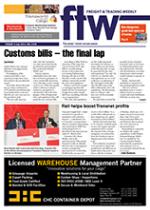South Africa’s new customs
bills have been approved by
Parliament.
Promulgation of the
controversial bills is now
imminent as they have been
forwarded to the president for
assent.
The South African Revenue
Service (Sars) confirmed to
FTW that the translations had
been finalised last week and
that the new acts were now on
the president’s desk.
“The acts will, however,
only come into operation
on a date determined by the
president by proclamation,”
Sars spokesman Marika
Muller said.
Various industry
stakeholders have also since
been invited to participate in
a Sars round-table discussion
set to take place in the coming
week or two. While the agenda
of this conference remains
unknown, speculation is
rife that this will be the first
glimpse of the all important
rules and regulations that will
guide the new customs bills.
According to Mike Walwyn,
chairman of the Cape Port
Liaison Forum (PLF), this
follows an undertaking
by Sars in November last
year during Parliamentary
hearings into the new bills
that they would consult with
industry extensively around
the rules and regulations.
Walwyn said in this regard
a working group from the
South African Association of
Freight Forwarders (Saaff)
had been consulting with Sars
on an ongoing basis.
“The rules and regulations
are the really important
documents for industry as
many of the new provisions
in the bill only state “as may
be prescribed by the rules
and regulations”,” he said. “So
until we see what the rules
and regulations are we won’t
really have an indication of
the real impact of the bills.
Also the bills cannot take
effect without the rules and
regulations. The discussions
that we will have with
Sars now will be extremely
important.”
He said claims around the
possible closure of inland
terminals such as City Deep
in Johannesburg had come
up in discussions with Sars
and all indications were that
inland ports and terminals
would continue to operate as
per usual.
Muller said Sars had
absolutely no intention of
interrupting legitimate trade.
“The new customs
legislation aims to create a
balance between customs
control and trade facilitation.
With this in mind, Sars
reviewed the current policy
of allowing goods to move
on the basis of a manifest
to inland terminals such as
City Deep without checks,
since adequate information
is needed to determine
any potential risk in goods
crossing our borders,” she
explained. “Currently,
containers are moved on
the basis of a manifest –
which has only a general
description of the goods, with
no details of value or origin.
This description is based on
hearsay information obtained
from an entity in a foreign
jurisdiction, which is merely
reflected on the manifest by
the carrier. As a result, goods
can move inland without
any South African authority
knowing what a container
actually holds.”
Muller said Sars had a duty
to control the movement of
goods across South Africa’s
borders in order to protect
the fiscus, the economy and
wider society.
“The customs control
bill envisages a clearance of
goods at the first port of entry
into South Africa. This will
require a declaration of the
true value of the goods, the
origin of the goods, and a
clear description of the goods.
Additionally, the person
submitting such a declaration
must be in South Africa
and will be held liable as
regards the correctness of the
information submitted.”
Professor Sieg Eiselen
from Unisa, a leading
South African expert on
International Trade Law,
confirmed that it was
incorrect for critics to state
that the change in policy
would force traders to change
the terms of their contracts of
sale and that it would result
in carriers no longer issuing a
through bill of lading.
“Suggestions that all
inspections of goods will be
done at coastal ports like
Durban are also incorrect.
Sars has no intention of
increasing inspections
beyond available capacity
at any port. Only high-risk
goods (which are a minute
percentage of imports) will
be physically inspected at
coastal ports, whilst mediumto
low-risk goods (which
represent the vast majority of
imports) will continue to flow
to inland terminals such as
City Deep where they will be
inspected,” said Muller.
Customs bills – the final lap
04 Jul 2014 - by Liesl Venter
0 Comments
FTW - 4 Jul 14

04 Jul 2014
04 Jul 2014
Border Beat
Featured Jobs
New
New
